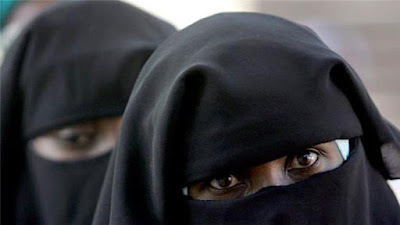
Female Muslim students in Lagos have urged the Court of Appeal to reverse the decision of a Lagos State High Court, which banned the use of hijab (head to shoulder veil used by Muslim women) in public primary and secondary schools in Lagos State.
Justice G.M. Onyeabo had on October 17, 2014, dismissed a suit filed by two female Muslim students of Atunrashe Junior High School, Surelere, Asiyat Abdulkareem and Maryam Oyeniyi, who challenged the ban on hijab.
The students had sued for themselves and on behalf of others under the umbrella of the Registered Trustees of Muslim Students’ Society of Nigeria.
The applicants had headed for the court in protest against the decision of the Vice Principal of their school, who sometime in January 2012, directed all students and teachers wearing hijabs to remove them.
They had urged the court to declare that the ban on hijab violated their rights to freedom of thought, conscience, religion, dignity of human persons and freedom from discrimination guaranteed by the Nigerian constitution.
But Onyeabo dismissed the suit, holding that the ban was neither discriminatory nor a breach of sections 38 and 42 of the 1999 Constitution as argued by Chief Gani Adetola-Kazeem, who represented the students.
The judge held that allowing the use of hijab in public schools, as prayed by the students, would jeopardise Section 10 of the 1999 Constitution, which makes Nigeria a secular state.
“The values of plurality and the respect for the rights of others who have subscribed to a non-faith based educational system cannot be breached,” the judge had said.
She added that since public schools were funded by the state, the responsiblity to issue dress code for the students also lied with the government.
But displeased, the students, through their legal team comprising five Senior Advocates of Nigeria and other lawyers, have urged the Court of Appeal to overrule the decision of the lower court.
They urged the appellate court to determine whether the trial judge acted within the law, when she held that Section 10 of the 1999 Constitution makes Nigeria a secular state, when the defendants did not canvass such an argument.
They also want the appellate court to decide whether the trial judge was right in pronouncing that the use of hijab would cause disunity, distraction and discrimination against students of other faiths.
They want the Appeal Court to determine whether it was right for the trial judge to believe that there was a state policy banning the use of hijab in Lagos public schools by relying only on oral evidence without any documentary or statutory instrument.
They urged the appellate court to hold that the respondents breached their constitutionally guaranteed rights under sections 38 and 42 of the 1999 Constitution, when they suddenly stopped them from wearing hijab in compliance with the tenets of their religion.
The respondents in the appeal are the Lagos State Government, its Attorney General and Commissioner for Justice, the state Commissioner for Education and the state Commissioner for Home Affairs and Culture.







Post a Comment
Post a Comment